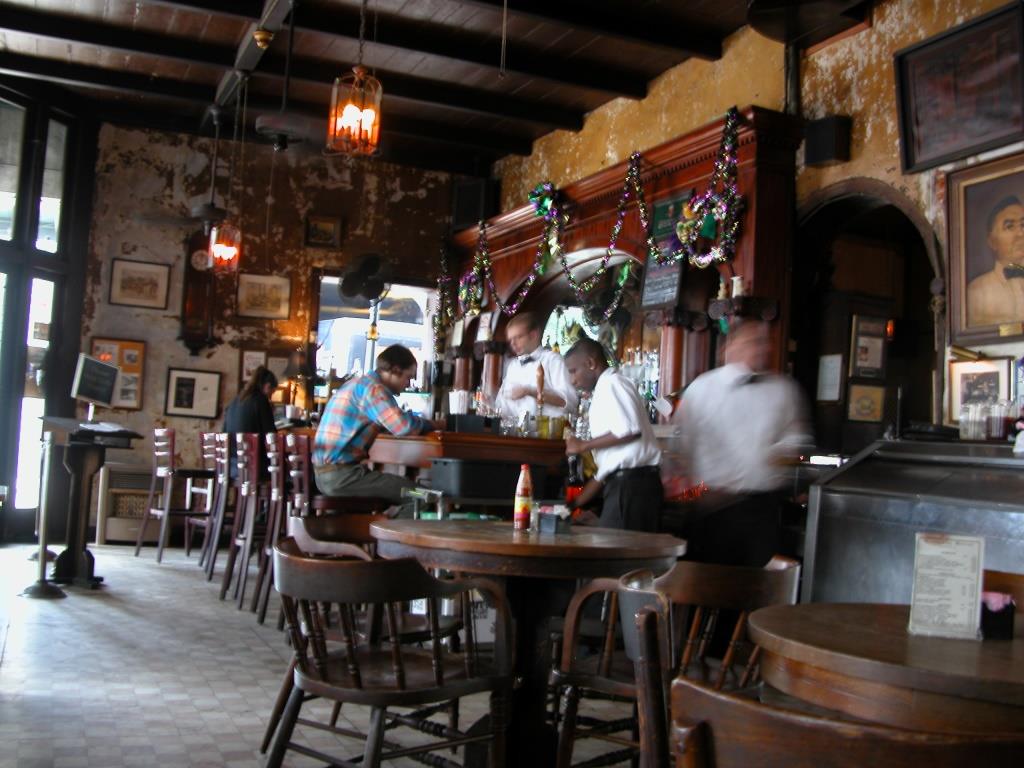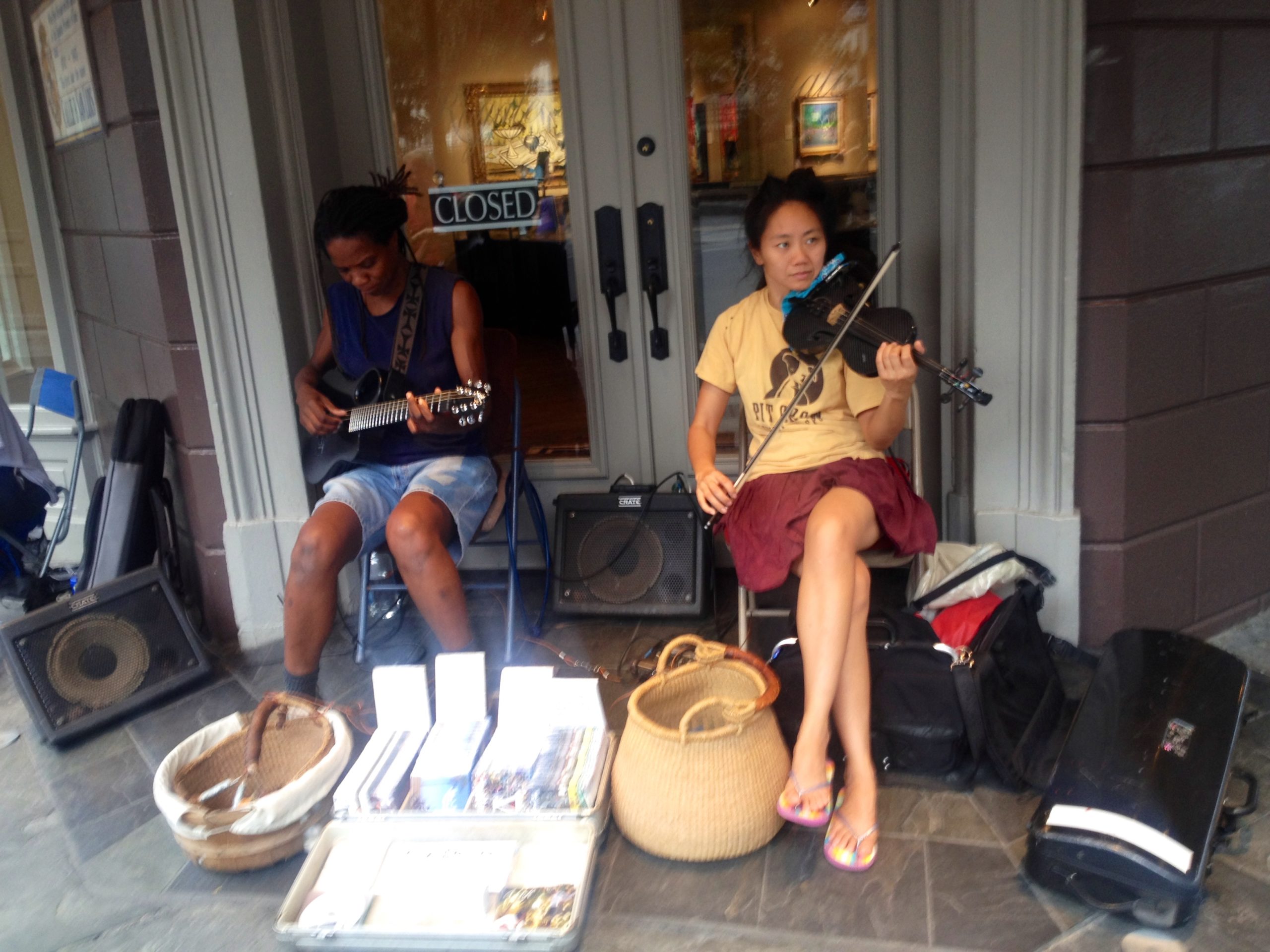Writing in Place
Kari Mugo writes her way through the French Quarter during the New Orleans Writing Marathon and, in the process, ownership of the declaration, "I am a writer."

“I’m a writer.” Saying that, I feel like I’m at an AA meeting. We’re asked to turn to our right and left and tell the people sitting next to us that we are writers. The prompt comes after we’ve all gone around the room introducing ourselves by name and place of origin. “I’m a writer,” I repeat to the smiling woman to my left. And this is how my New Orleans Writing Marathon begins, sitting in a ballroom at the historic Hotel Monteleone, near the edge of the French Quarter.
The Marathon, hosted alongside the Tennessee Williams Literary Festival, invites attendees to write their way through the sights and sounds of the French Quarter. I signed up for it months in advance, not knowing what to expect, and now there were 13 of us sitting in a circle declaring ourselves writers. In principle, the event is an exercise in free-writing, a reflection on place and a chance to step beyond solitary pursuit of the craft and commune with others in the writing process. In practice, the writing marathon amounts to a haphazard walking tour of New Orleans punctuated by food, drink, and the word — both spoken and written.
The Marathon’s meandering style is the brainchild of Richard Louth of the Southeastern Louisiana Writing Project, with nods to Natalie Goldberg, who originated the idea in Writing Down the Bones, and to Hemingway, who famously drew inspiration while writing in Parisian coffee shops. I’m no Hemingway, but the curious venture of peeking into the characters that occupy the French Quarter is something I find I can get into.
We are to split up into small groups of three to five writers, collectively agreeing on how long we would like to commit to the Marathon (anywhere from three hours to the entirety of the day). Then we’re to venture into the Quarter, picking a new venue each hour and writing there for a suggested 10 minutes, or longer if we want. We are encouraged to become “professional eavesdroppers listening to the muses among us,” letting our pens wander over the paper continuously until the clock runs out. No thinking, no correcting, just a stream of consciousness captured on the page. Afterward, each writer is share what she has written by reading aloud to the group; when listening, we are to offer nothing more than a simple “thank you” before moving onto the next recitation.
Even more terrifying than publicly claiming to be a writer in a room full of them is the prospect of reading through my roughly conceived work with a group of strangers. I live for the edits, for the redrafting and revising; what writer doesn’t? I looked around the room sizing up the group, looking for signs of malice, making myself comfortable with their faces, the eyes that will soon be on me.
We have our first writing exercise while sitting in a ballroom too large and ornate for our small group of 13; the space is pumped so full of cold from the AC that the rain outside seems preferable. We write for 15 minutes, and my hand struggles to keep up with my mind. I’m stumbling, keenly aware how long it has been since I have handwritten anything. In his introduction, our writer-teacher has mentioned taking the ferry to the river bend in an earlier Marathon, and now my mind fixates on this as I put pen to page. I write about the Mississippi River’s distinct bends around the city of New Orleans and all the things those curves remind me of.
March 26th, Queen Anne Ballroom, 1st Write
“These words that keep finding themselves in necklaces and denim, in an art market late at night after a bottle of wine. The bend that finds itself again on a map I have looked over many times as she told me “that’s where I live.” It’s the same bend her roommate tells me of as she delights me in brilliant reds over coffee with a tale to save the cities and towns that carry beyond it. To the ‘world’s end’ she called it. Or was it the end of the world? She wants to take me there, too, to this place where the world comes to an end and there is nothing left to do but jump into the water.”
As my tortured hand fights to remember how to write freely, keeping on task proves the hardest part of all. The temptation to distraction that often comes over me when I’m writing is especially hard to resist in this space. When we are done, we look around the room—exhausted, nervous, unsure of either ourselves or the task. And then comes the sharing. The writing we hear is funny, neurotic, sad, stale, hopeful; it’s rooted in the room, yet also scattered through Austin, San Francisco, Cincinnati, millennial angst, friendships, and the questioning that comes with middle age. As each writer reads, their offerings greeted with a room full of thank yous, I suddenly understand the why of this process.
The intentionality in the writing exercise forces your mind to wander into nooks and crannies; you can’t help but find the implicit connections as your thoughts leap around the room and the people within and without it. The affirmation of your work that follows is just as critical; to offer up your love-child, born prematurely, to other writers without fear of rejection or criticism. I’m struck by the generosity of the group’s simple “thank you” when my fast-talking is through and I sit back down, rattled, breathless, emptied of my interior monologue.
“I am a writer,” I say to myself, a chuckle in my chest.

We split up afterwards, and I wind up in a group of five. The difficulty in trying to decide where to go as a group of five strangers with varying knowledge of the city becomes quickly apparent. After a few failed attempts, dithering in doorways, huddling together with too few umbrellas, we find ourselves at a diner on the corner of Chatres and Iberville Street: Mena’s Palace. I have sub-par grits and write nothing worthwhile, but I do listen intently — to the black coffee being poured into my mug, the loudly patterned pants on a woman sitting to the right of me.
Mena’s Palace Restaurant 11:13 am
“Every time I walk through the Quarter, I feel like I’m playing a game of ‘spot-the-tourist,’ fighting to distinguish myself from the flock, seeking the true N’awlin’s experience. The coffee, it interrupted my thoughts, then the girl with the phone. I wonder if I should get 30 seconds more, but I’m just wasting space again. Coffee, coffee, black black coffee, coffee black like my skin, like the waitress who we will all write about or actively pretend not to write about.”
The reading goes easier this time; our little group has developed some camaraderie, even if the space has proved uninspiring for me. I look back at the handout we all received at the beginning of the day, a reading from Hemingway’s A Moveable Feast, longing for a union such as his:
“The story was writing itself and I was having a hard time keeping up with it. I ordered another rum St. James and I watched the girl whenever I looked up, or when I sharpened the pencil with a pencil sharpener with the shavings curling into the saucer under my drink. I’ve seen you, beauty, and you belong to me now, whoever you are waiting for and if I never see you again, I thought. You belong to me and all Paris belongs to me and I belong to this notebook and pen.”
It is after noon now, which means it’s permissible to engage in drink, especially in a city whose bars never close. We make a bee-line for the Napoleon House, three blocks down, past the courthouse and a speeding pick-up truck that would have surely taken out the nice woman from North Carolina had she not stepped onto the curb seconds before. Someone engages in tales of the judges, lawyers, and writers who have come here to work as we have, fortified with cocktails while lazy fans spun above them. I wish for sun so we might sit in the Spanish courtyard I can see tucked in the back of this very old bar.
I could write about this bar, in this bar, for hours: its peeling walls are covered with enough names to fill even the most ambitious book. Even the easygoing banter of the waiters who dance around me as I move to explore the secret rooms behind the bar seems noteworthy; I’m equally charmed by the characters populating the randomly situated tables inside the Napoleon House as I am with those who hurry past the grated windows in the mild Louisiana rain. I have found my muse.
Napoleon House 12:20 pm
“The reins are loosened, the theoretical horse charging forth, seizing the city and taking in all its sights and sounds, the dirty corners and dim chatter punctuated by brilliant smiles. There’s a romance in the rain, a Parisian tale waiting to be told as raindrops bounce off everything that moves or is still. A truck races forth, its tires piercing the calmness of pooled water as pedestrians step back quickly to avoid the charging beast on four wheels. I wonder how many horses sit under its hood. The duality of words, the way we reinvent old ones to mean new things, rarely creating new ones.
Liz, in her many stories, told me how water always seeks the lowest point, to find its base, the foundation, not aspiring for more. I marvel at this old idea, as if discovering it for the first time, watching the water more closely in the days after, seeing where it goes, how the drops collect into streams that flow into puddles that together seek to find that lowest point. This bar, with its windows that look out into the world, the walls that are defiant in their story-telling, no matter how many people write their names on them. The windows that carry the light breeze from the courtyard outward. No, there are two breezes, not one. One flows over my back in gentle caresses, teasing its way down my shoulders and embracing my arms. Then there is the other breeze, the one that carries itself over raindrops and thuds its delivery on my chest. This one less gentle.
I had written about the lazy fans that spin in New Orleans rooms before I could picture them in motion as they make their graceful, unassuming, and precise movements above heads.”
Ten minutes, that is how long we’ve committed to stay. But as my eyes scan the room, and my ears and skin savor the city through this space, I understand how Hemingway could have written about Michigan in a cafe in Paris. It’s not about where you are, but what inspires you to write, to create. We come here seeking the muses that are all around us. We come here to recall how to listen, and to deny ourselves the escape of diversion in favor of committing ourselves to the making of something from it, for a time.
Kari Mugo is a queer writer, who was born and raised in Nairobi, Kenya and spent her formative years in the Midwest. When not mulling to deeply over things, she is making lists out of her lists. She is a contributor for Mshale Newspaper and Matador Network. Her work has also appeared on Autostraddle.com, CurveMag.com, The Toast.net, and Racialicious.com. You can follow her on Twitter @the_warm_fruit.